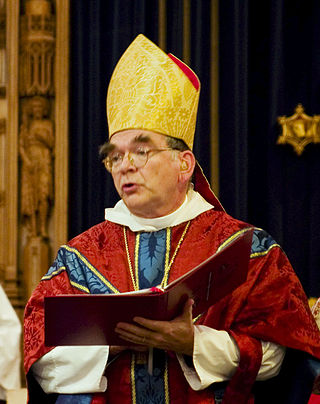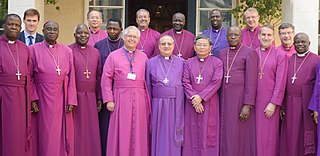The Anglican Communion Network was a theologically conservative network of Anglican and Episcopalian dioceses and parishes in the United States that was working toward Anglican realignment and developed into the Anglican Church in North America.
The Diocese of New Westminster is one of five dioceses of the Ecclesiastical Province of British Columbia and the Yukon of the Anglican Church of Canada. The see city is Vancouver. The current bishop is the Right Reverend John Stephens. He was consecrated as the coadjutor bishop on January 23, 2021, and installed as diocesan bishop on February 28, 2021. The Dean of New Westminster and rector of the cathedral is the Very Reverend Christopher Pappas and the Diocesan Archdeacon is the Venerable Nick Pang.

The Anglican Church of Canada is the province of the Anglican Communion in Canada. The official French-language name is l'Église anglicane du Canada. In 2022, the Anglican Church counted 294,931 members on parish rolls in 1,978 congregations, organized into 1,498 parishes. The 2021 Canadian census counted 1,134,315 self-identified Anglicans, making the Anglican Church the third-largest Canadian church after the Catholic Church and the United Church of Canada.

Robert William Duncan is an American Anglican bishop. He was the first primate and archbishop of the Anglican Church in North America (ACNA) from June 2009 to June 2014. In 1997, he was elected bishop of the Episcopal Diocese of Pittsburgh. In 2008, a majority of the diocesan convention voted to leave the diocese and the Episcopal Church and, in October 2009, named their new church the Anglican Diocese of Pittsburgh. Duncan served as bishop for the new Anglican diocese until 10 September 2016 upon the installation of his successor, Jim Hobby.

The Anglican Catholic Church of Canada (ACCC) is a Continuing Anglican church that was founded in 1979 by traditional Anglicans who had separated from the Anglican Church of Canada. The ACCC has fifteen parishes and missions; with two bishops and 22 clergy.
The Traditional Anglican Church (TAC), formerly the Traditional Anglican Communion, is an international church consisting of national provinces in the continuing Anglican movement, independent of the Anglican Communion and the Archbishop of Canterbury. The TAC upholds the theological doctrines of the Affirmation of St. Louis. Each of the respective jurisdictions utilizes a traditional Book of Common Prayer deemed to be free of theological deviation. Most parishioners of these churches would be described as being traditional Prayer Book Anglicans in their theology and liturgical practice. Some Anglo-Catholic parishes use the Anglican Missal in their liturgies. The TAC is governed by a college of bishops from across the church and headed by an elected primate.

Anglican Essentials Canada is a Christian group of Anglicans who share a common commitment to "faithful biblical orthodoxy," often broadly meaning an opposition to progressive norms embraced in the late 20th and early 21st century, but also reflecting a general trend toward conservatism and orthodoxy in thought and practice.
In 2003, the Lambeth Commission on Communion was appointed by the Anglican Communion to study problems stemming from the consecration of Gene Robinson, the first noncelibate self-identifying gay priest to be ordained as an Anglican bishop, in the Episcopal Church in the United States and the blessing of same-sex unions in the Anglican Diocese of New Westminster. The Commission, chaired by Archbishop Robin Eames, published its findings as the Windsor Report on 18 October 2004. The report recommended a covenant for the Anglican Communion, an idea that did not come to fruition.
The September 14–16, 1977 Congress of St. Louis was an international gathering of nearly 2,000 Anglicans in St. Louis, Missouri, united in their rejection of theological changes introduced by the Anglican Church of Canada and by the Episcopal Church in the United States of America in its General Convention of 1976. Anglicans who attended this congress felt that these changes amounted to foundational alterations in the American and Canadian provinces of the Anglican Communion and meant that they had "departed from Christ's One, Holy, Catholic and Apostolic Church." Theological liberalism, financial support for political action groups, participation in the Consultation on Church Union (COCU), revisions to the Book of Common Prayer, and the ordination of women priests were not the only reasons for the split, but they were seen by these churches as evidence of the mainline church's departure from Anglican orthodoxy. The idea for a congress originated with the Reverend Canon Albert J. duBois in 1973 in preparation for the Louisville General Convention of the Episcopal Church. Canon duBois and the group called "Anglicans United" toured parishes in advance of the Congress to garner support. In 1976, the Fellowship of Concerned Churchmen, an organization founded in 1973 as a coordinating agent for laypeople and clergy concerned about the breakdown of faith and order within the Episcopal Church and the Anglican Church of Canada, met to organize a Church Congress in St. Louis the following year.
The Convergence Movement, also known as the Ancient-Future Faith, whose foundation is primarily attributed to Robert E. Webber in 1985, is an ecumenical movement. Developed as an effort among evangelical, charismatic and Pentecostal, and liturgical Christians and denominations blending their forms of worship, the movement has been defined for its predominant use of the Anglican tradition's Book of Common Prayer; use from additional liturgical sources common to Lutheranism, Eastern Orthodoxy, and Catholicism have also been employed.
The Anglican realignment is a movement among some Anglicans to align themselves under new or alternative oversight within or outside the Anglican Communion. This movement is primarily active in parts of the Episcopal Church in the United States and the Anglican Church of Canada. Two of the major events that contributed to the movement were the 2002 decision of the Diocese of New Westminster in Canada to authorise a rite of blessing for same-sex unions, and the nomination of two openly gay priests in 2003 to become bishops. Jeffrey John, an openly gay priest with a long-time partner, was appointed to be the next Bishop of Reading in the Church of England and the General Convention of the Episcopal Church ratified the election of Gene Robinson, an openly gay non-celibate man, as Bishop of New Hampshire. Jeffrey John ultimately declined the appointment due to pressure.

The Global South Fellowship of Anglican Churches (GSFA), formerly known as Global South (Anglican), is a communion of 25 Anglican churches, of which 22 are provinces of the Anglican Communion, plus the Anglican Church in North America and the Anglican Church in Brazil. The Anglican Diocese of Sydney is also officially listed as a member.

Colin Robert Johnson is the former Anglican archbishop of Toronto and Moosonee, and he served as Metropolitan of the Ecclesiastical Province of Ontario from 2009 to 2018. He was the 11th Bishop of Toronto, the largest diocese in the Anglican Church of Canada.
The Global Fellowship of Confessing Anglicans is a communion of conservative Anglican churches that formed in 2008 in response to ongoing theological disputes in the worldwide Anglican Communion. Conservative Anglicans met in 2008 at the Global Anglican Future Conference, creating the Jerusalem Declaration and establishing the Fellowship of Confessing Anglicans (FCA), which was rebranded as GAFCON in 2017.
The Anglican Church of Canada is the third largest church in Canada, after the Roman Catholic Church and the United Church of Canada. After many years of debate, the first blessing of a same-sex partnership took place in 2003, by the Diocese of New Westminster, in Vancouver. This was not considered a marriage ceremony, but rather a blessing of "permanent and faithful commitments" between persons of the same sex.

Stephen Wing Hong Leung is a Canadian bishop. Since 2009, he has served as suffragan bishop with responsibility for Asian and multicultural ministry in the Anglican Diocese of Canada, a diocese of the Anglican Church in North America formerly known as the Anglican Network in Canada (ANiC).

Trevor Walters is a British-born Canadian bishop of the Anglican Church in North America. From 2009 to 2021, he was suffragan bishop with responsibility for western Canada in the Anglican Network in Canada. As a priest in the Diocese of New Westminster in the early 2000s, Walters played a major role in the Anglican realignment in Canada.
Felix Clarence Orji is a Nigerian-born American Anglican bishop. A former Episcopal priest who left the Episcopal Church as part of the Anglican realignment, Orji was consecrated a bishop in Nigeria in 2011 to serve the Convocation of Anglicans in North America. Since 2013, he has been the diocesan bishop of the Anglican Diocese of All Nations, which was a dual member of both the Church of Nigeria and the Anglican Church in North America from 2013 to 2019, a member of the Church of Nigeria North American Mission from 2019 to 2022, and a sole member of the ACNA since 2022.

St. John's (Shaughnessy) Memorial Church is an Anglican parish in the Shaughnessy neighborhood of Vancouver. Founded in 1925, the church is part of the Diocese of New Westminster in the Anglican Church of Canada. Once reported to be the largest Anglican church in Canada and a bastion of evangelicalism, most of the congregation and clergy left during the Anglican realignment and the church is today much smaller and aligned with the progressive wing of Canadian Anglicanism.
St. John's Vancouver Anglican Church is an evangelical Anglican church in Vancouver, British Columbia, Canada. It was founded in 2011 by the clergy and almost all of the laity of St. John's Shaughnessy after the group left the Anglican Church of Canada over theological and moral issues and the congregation lost a legal battle to keep its building during the Anglican realignment. With more than 700 in regular attendance, it is the largest church in the Anglican Diocese of Canada, a diocese of the Anglican Church in North America.









